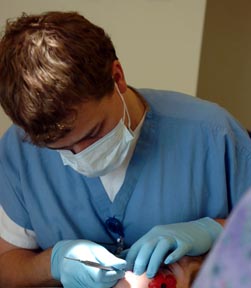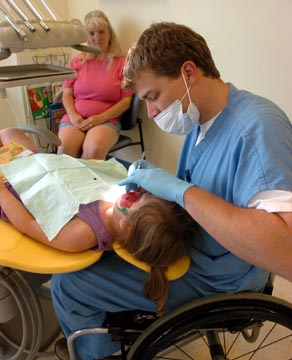JACKSON—After suffering a paralyzing spinal cord injury at age 15, Hayden Perkins of Madison spent some time “running himself into the ground” with a litany of what-ifs.
What if he hadn’t taken a friend’s dog to the vet? What if he had put his seatbelt back on after stopping at a store? What if he hadn’t lost control of his car?
“Then I finally realized I can sit here and feel sorry for myself or I can get off my butt and do something.” That decided, Perkins set off on a path that led to his current position as a pediatric dentistry resident at the University of Mississippi Medical Center in Jackson.
Today, the 28-year-old father of three says he rarely thinks about being in a wheelchair. But he is aware of the impression he makes whenever he grabs a quick lunch in the cafeteria of nearby Methodist Rehabilitation Center.
The spinal cord injury patients there can’t help but be encouraged by the sight of a young guy in scrubs piloting a wheelchair. It’s proof that a disabling injury doesn’t have to derail your career plans.
Recognizing that newly injured patients often have concerns about their employability, Methodist encourages former rehab “graduates” like Perkins to come back and share their accomplishments. The hospital also puts patients in contact with a variety of resources to help them explore career options.
The Mississippi Department of Rehabilitation Services maintains an office on the hospital’s second floor and counselors there make it point to apprise new patients of how the department can help them return to work or school.
“Most of the time they already have some idea of what they want to do,” said Jocelyn Wilson, a certified rehabilitation counselor for the department. “Our job is to explore whether we can help them achieve it.”
Assistance can range from financial aid for college costs to help securing special equipment. For instance, Wilson said she helped one aspiring athletic trainer get special tires for his wheelchair so he could navigate the football field.
Methodist case managers and therapists offer support, as well, visiting school and job sites to determine the need for accommodations or to recommend assistive technology, such as computers that can be operated by voice commands.
The same assistance is offered to people recovering from brain injuries at Quest, Methodist’s comprehensive community re-integration program. There, staff help facilitate a successful return to school, work or community life by playing the role of liaison. They often work with employers to break down the skills necessary for a specific job, then incorporate those skills into therapy sessions.
“In the school setting, we lay the groundwork for a smooth transition by providing the school staff with recommendations on how best to work with students,” said Quest admissions coordinator Joyce Leverenz. “And we monitor their progress. Our experience with school systems is you have to have a strong advocate to get what you need, but you also have to know what you need. Doctors might not think to let teachers know that a student might need more time to take a test, or a study class to work on notes or a cassette recorder to tape lectures.”
Since passage of the Americans with Disability Act, accessibility is not as big an issue as it used to be, Wilson said. “The issue you hear more about is the attitude of instructors about having to make accommodations. Some don’t want lectures recorded or note takers in the room.
“There’s also this general attitude that because a person has a disability they can’t comprehend or do the class work. Some people still have this mentality that a person with a disability can’t do the job. A wheelchair does not mean a person’s productivity would be less. Often it’s more because they feel like they have to prove themselves.”
Perkins said he feels fortunate to have been surrounded by people who never focused on his limitations. “I had really good friends that took me in and took care of me and never looked back. They wouldn’t allow me to not do things. When they would go to the lake, they would pick me up, toss me in the boat and we would do anything.”
Perkins, who is a paraplegic, said he decided to consider becoming a dentist after noticing they sit down 90 percent of the day. “I took my pre-med and chemistry classes and absolutely loved it. People look up to you as a health care professional and that was interesting to me.”
Perkins said when he didn’t get into dental school on his first try, “I thought they might think I didn’t have the dexterity or hand skills.” But he has since found “it’s no harder for me to do the work than anyone else.” Indeed, he believes he may be where he is today because of his injury, rather than in spite of it.
“I tell people this now and I know they think I’m crazy. But if I had a chance to go back and change things, I don’t think I would. It was a wake-up call for me. I wasn’t doing well in school, and I didn’t see me making much of myself. It made me grow up.”


